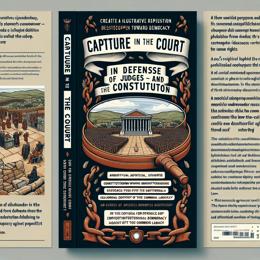Image created by AI
New York Attorney General Prepared to Seize Trump's Assets over $355M Fine
The New York State attorney general, Letitia James, has sent a strong message to former President Donald Trump regarding the consequences of failing to pay a substantial fine levied upon him following a fraud trial. In a clear and significant statement to ABC News on Tuesday, James said her office would not hesitate to seize assets belonging to Trump, including his high-profile skyscrapers, if he cannot produce the necessary funds to cover a $355 million fine, which is approximately 6.7 billion South African Rand.
The sizeable fine stems from a verdict delivered by a New York judge last week, which concluded that Trump had committed repeated and persistent fraud. According to the ruling, Trump was found to have significantly overstated his net worth by billions to secure more favorable loan terms. The figure cited amounts to an overstatement of around $3.6 billion a year—a substantial inflation of value that the court has judged as fraudulent.
Trump, who has been a dominant figure in the Republican Party and considered a front-runner for the party's next presidential nomination, has categorically denied any impropriety. He has started the process of appealing the fine, suggesting a lack of victims as part of his defense. Moreover, he has levied accusations of bias against James, accentuating the intense political backdrop of this legal confrontation. The dispute highlights a complex intertwining of legal and political narratives that have been a hallmark of Trump's post-presidential period.
Despite Trump's vociferous denial of wrongdoing, Attorney General James remains resolute. She insists on the robustness of the case her office has presented, underlining the significance of financial fraud and its impact. In her view, as conveyed in the ABC News interview, the actions attributed to Trump were far from benign errors but rather constituted profound, deliberate, and vast manipulation.
Speaking to the breadth and gravity of the allegations, James stated that Trump's actions represented more than a trivial oversight. The variations in asset worth that Trump's organization presented weren't just minor exaggerations but were instead wildly inflated. The extent, according to James, was staggering, painting a picture of deep and systemic distortions within Trump's business disclosures.
While the former president's appeal might emphasize the absence of victims, James counteracted this claim by stressing that "financial frauds are not victimless crimes."
This case is set against the backdrop of the larger landscape of Trump's business affairs, which often have come under legal scrutiny, especially since he left the office of the presidency. His business tactics, particularly regarding his debt and asset valuation, have received widespread attention, now more so with the forceful response indicated by the attorney general.
The potential consequences of the fine—if it were to stand following the appeal—could be substantial for Trump. The seizure of assets, a measure James preemptively addressed with the apprehension of potential difficulties in collection, would mark one of the most dramatic legal repercussions Trump has faced.
The story's revelation also intertwines with the broader narrative of accountability of public officials and transparency in financial operations, intently watched by the public and media, and likely to continue as a significant storyline, especially if Trump seeks to re-enter the political fray in earnest.
The unfolding of this legal saga will undoubtedly garner widespread attention, as the world watches to see if an attorney general can indeed compel a former U.S. president to surrender assets on such a scale, and what other implications might follow in this unprecedented scenario of justice and power.


